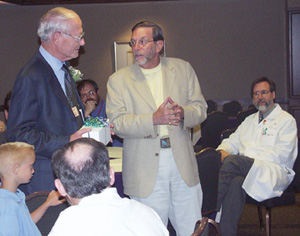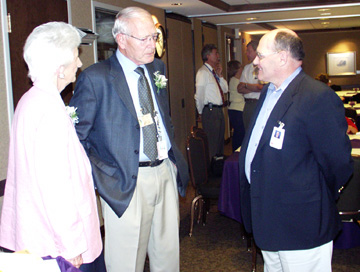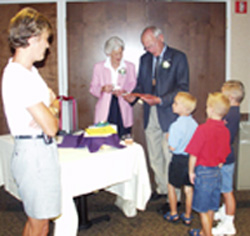 Hobart “Hobe” Wiltse, M.D., Ph.D., has seen UNMC come a long way since he first stepped on campus in 1953 as a medical student.
Hobart “Hobe” Wiltse, M.D., Ph.D., has seen UNMC come a long way since he first stepped on campus in 1953 as a medical student.
A professor in the department of pediatrics, Dr. Wiltse may have the most longevity of any current UNMC faculty member. He retired June 28, bringing to a close an outstanding career in which he made a difference in the lives of literally thousands of patients, families and students.
“Dr. Wiltse is the spirit of pediatrics at UNMC,” said Bruce Buehler, M.D., chairman of pediatrics and director of the Munroe-Meyer Institute. “His dedication to prepare all students to take care of children in their practice, to value families, and to always be a ‘teacher’ has been the reason for so many students becoming pediatricians.
“He always had time to talk to any student, to welcome students from other universities, and to take on any task to improve teaching methods. It also is important to remember he was an active metabolic pediatrician with a significant practice throughout his tenure at UNMC. Hobart will be missed, but truly his legacy is forever.”
 With the exception of four years (1964 to 1968) when he was doing his pediatric fellowship training at Johns Hopkins University and the UCLA School of Medicine, Dr. Wiltse spent his entire career at UNMC.
With the exception of four years (1964 to 1968) when he was doing his pediatric fellowship training at Johns Hopkins University and the UCLA School of Medicine, Dr. Wiltse spent his entire career at UNMC.
A Falls City, Neb. native, Dr. Wiltse, 70, graduated from the University of Nebraska-Lincoln in 1953 and earned his medical degree from UNMC in 1958. He went on to earn a Ph.D. in biochemistry in 1965. He spent 37 years on the faculty, serving as professor since 1977.
Dr. Wiltse’s specialty was taking care of children with metabolic disorders. As he put it, “I have a four-volume set in my office (describing all the metabolic disorders). The books contain 6,338 pages and describe more than 500 disorders, most of which are unfamiliar to most medical practitioners.”
He has been a leader in pushing through mandatory newborn testing in Nebraska to detect metabolic disorders. All infants in Nebraska must have a blood test to see if they have biotinidase deficiency, congenital primary hypothyroidism, galactosemia, phenylketonuria (PKU), medium-chain acyl CoA dehydrogenase deficiency (MCAD), or sickle cell anemia or other blood irregularities.
 In 2000, a grateful Omaha couple, Dan and Lisa Koch, honored Dr. Wiltse for his work in taking care of their son, Michael, who was born with a rare condition called lactic acidemia. The Kochs made a major donation to establish the Michael Koch Endowment through the Children’s Hospital Foundation. The endowment was used to fund the creation of the Hobart Wiltse Center for the Study of Metabolic Disorders at Children’s Hospital.
In 2000, a grateful Omaha couple, Dan and Lisa Koch, honored Dr. Wiltse for his work in taking care of their son, Michael, who was born with a rare condition called lactic acidemia. The Kochs made a major donation to establish the Michael Koch Endowment through the Children’s Hospital Foundation. The endowment was used to fund the creation of the Hobart Wiltse Center for the Study of Metabolic Disorders at Children’s Hospital.
The center has become an international facility providing clinical care, professional education and research into pediatric metabolic disorders.
During his tenure, Dr. Wiltse has seen the field of genetics explode, bringing new challenges as he tries to stay current with ongoing developments. At the same time, he has seen the face of the Medical Center undergo dramatic changes.
“The Medical Center didn’t have a strong reputation back in the 1950s,” he said. “It has grown steadily ever since.
“It’s been great. I leave with a sense that the place needed me – just like it needs all of us to keep building. I hope I’ve made a small contribution.”
In reviewing his career, Dr. Wiltse holds a special place in his heart for all the medical students he helped train.
“I earned my keep as an educator, and I really did enjoy it,” he said. “In most years, I’ve gotten to know every medical student in the class.”
Along the way, his educational career was spiced with a variety of opportunities that allowed him to grow professionally:
- From 1975 to 1976, he served as acting chairman of the department of pediatrics.
- From 1976 to 1979, he was assistant dean for curriculum. During that time, the medical school decided to experiment by compressing the traditional four years of curriculum into three years. “What can I say,” Dr. Wiltse joked, “I’m a glutton for punishment.”
- From 1982 to 1983, Dr. Wiltse served as interim director of the Meyer Children’s Rehabilitation Institute (now called the Munroe-Meyer Institute).
- For 25 years (1969 to 1994), he ran the eight-week pediatric clerkship program for third year medical students as well as the electives program for fourth year medical students.
Dr. Wiltse’s retirement will be filled with travel, music and taking care of the 175 rose bushes at his West Omaha home. He and his wife, Margaret, plan to travel to Alaska, Colorado, England, Ireland and New England over the next few months. Dr. Wiltse’s “rudimentary fluency” in three foreign languages – German, Russian and Italian – adds to the fun of traveling, he said.
An amateur organist, Dr. Wiltse occasionally plays the organ at his church, and he will continue to sing in the church choir. When he started getting arthritis in his hands 20 years ago, he found that playing the organ was “nice PT for my fingers.”
The Wiltses have two sons – John, 36, a mechanical engineer in Portland, and Todd, 34, an architect in Chicago.
Photos in descending order:
1)Hobart Wiltse, M.D., Ph.D., accepts appreciation from Bruce Buehler, M.D., chairman of pediatrics at UNMC, during a June 28 reception honoring Dr. Wiltse’s work. Dr. Wiltse is retiring after 41 years as a practicing physician;
2) Dr. Wiltse and his wife, Margaret, visit with Glenn Fosdick, chief executive officer of Nebraska Health System, during the June 28 reception;
3) Dr. Wiltse reads cards that were put together by Craig, Nick and Joe Blodgett of Elkhorn, Dr. Wiltse diagnosed and treated twins Nick and Joe, in the light blue and red shirts. As toddlers, the twins had rickets, a rare metabolic bone disease resulting from Vitamin D deficiency. When asked how he knew Dr. Wiltse, Joe responded simply: “He saved my life.” The boys’ mother, Mary Blodgett, is at left.